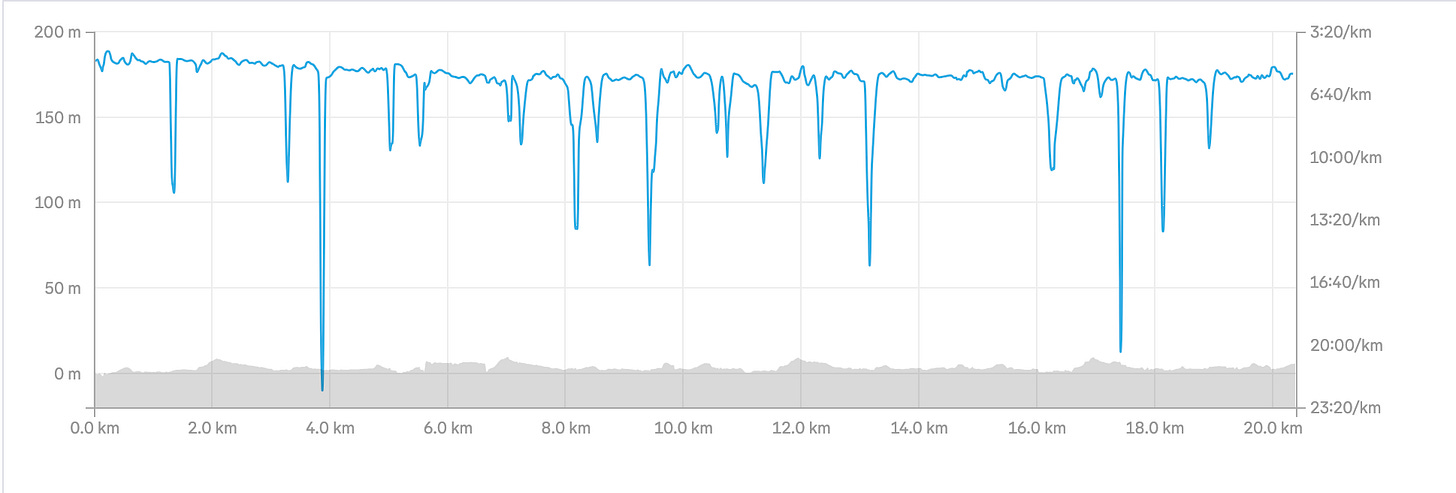Lessons From My Biggest Race Day Mistakes
Every endurance athlete makes mistakes. Some are small, while others lead to disastrous races, painful experiences, and hard-earned lessons.
I’ve made my fair share of errors, and while they were frustrating at the time, they’ve shaped me into a smarter and more prepared athlete.
Here are some of the biggest mistakes I’ve made—and what you can learn from them.
1. Poor Race Nutrition Led to GI Issues
Fueling for a race isn’t just about eating enough; it’s about eating the right things in the right timing. I’ve had several races where I got my carb intake wrong and/or electrolytes imbalance and ended up with stomach cramps, bloating, and emergency porta-potty stops. GI distress is one of the most common race-day issues, and it almost always comes from trying something new or not practicing race nutrition enough in training.
Last year I was doing Sines Triathlon and experimented something new (because why not?): I mixed 4 gels into one 750ml bottle. The issue is that gel doesn’t mix with water as isotonic powders do, which led to a blob of gel at the bottom of the bottle. In the last 10 min of the bike leg I must have consumed about 2/3 gels without knowing and after 15 minutes of running, I felt it. A huge stomach cramp and I puked a lot.
Lesson:
Test your race nutrition in training—same gels, same sports drink, same quantities, same methods.
Know your carb intake per hour and stick to what works.
Don’t overdo fiber or fat the day before the race (more on this later).
2. Hydration Mistakes Cost Me Performance
Underhydrating, overhydrating, and getting my sodium intake wrong have all led to serious consequences, from cramping to nausea to post-race dizziness. During longer races, I’ve learned that just drinking water isn’t enough—I need the right balance of fluids, electrolytes, and carbs to sustain performance.
In 2022 I did a 70.3 in Caminha, Portugal and I completed the race suffering in the most miserable half-marathon of my life. And the car ride home was awful too.
Lesson:
Know how much you sweat and how much sodium you lose.
Replace both fluids and electrolytes—not just one or the other.
Don’t chug water in the last 24 hours before a race; drink consistently in the days leading up.
3. Not Knowing the Bike Course
On the first ever triathlon race I did, I didn’t knew the bike course. Worse, it was in my home city. Mid-race, I was on the side of the road asking people where I should go since it was my 2nd lap. After this, my pacing was off, I was stressed, and I burned way too much energy trying to catch on.
Lesson:
Study the course and its profile—know the route, climbs, descents, technical sections and the laps are made.
If possible, ride or drive the course beforehand.
Plan your pacing and gearing strategy in advance.
4. Not Training Enough for the Race
There’s a fine line between overtraining and undertraining, and I’ve been guilty of the latter. Going into races underprepared, hoping to “just get through it,” has backfired badly. Whether it was skipping key long runs, not getting enough time on the bike, or neglecting brick sessions, these gaps in training always showed up on race day.
It happened in the same race of the last point, where I quit after 6km of run because I didn’t do enough transition trainings and didn’t have a good running base. I started to feel a lot of discomfort on my quadriceps and decided to quit.
Lesson:
Respect the distance. You can’t fake fitness in endurance sports.
Make sure you get in race-specific training, including long sessions at race pace.
Prioritize consistency over last-minute cramming.
5. Arriving Late and Setting Up in a Rush
One of the most stressful races I’ve had was entirely my fault. Last year, in Setúbal Triathlon, we had to leave our bikes in the transition park Saturday afternoon until 6pm, I arrived later than planned. I had to rush through getting the race stickers for the helmet and bike and the transition bags. Then, there were no parking spots, a long line, setting the bike, having dinner and resting enough. It created stress and affected my sleep. It’s a terrible way to begin an endurance event.
Lesson:
Arrive earlier than you think you need to—unexpected delays happen.
Give yourself plenty of time to set up transition calmly and go through your pre-race routine.
Visualize your transitions so you don’t forget anything last minute.
6. Eating the Wrong Pre-Race Dinner and Puking Everywhere
Having your first marathon the next morning? Perfect time to eat a lot of pepperoni pizza at way later than planned, right? Its like I did a bingo of wrong choices. Fat, spice, heavy and late. I was really full, didn’t sleep a lot, woke up really thirsty and bloated.
The result? 28km in I was vomiting, dehydrated, and a miserable race experience. I pushed through the last 14km without being able to eat gels, only drinking water and sipping on electrolyte drinks. It created a bad feeling when I think on marathon distance, something which I’m yet to tackle (Challenge Roth will go well, right? Right?)
Lesson:
Stick to familiar foods the night before a race.
Avoid heavy, fatty, or spicy meals—keep it simple and carb-focused.
If you’re racing early, eat dinner earlier so your stomach has time to digest.
Final Thoughts
Mistakes are part of the process, but they don’t have to be your mistakes. Learn from mine and others, plan ahead, and set yourself up for a great race. The more you refine your approach, the better you’ll perform—and the fewer disasters you’ll have to suffer through on race day.
What’s the worst mistake you’ve ever made in a race? Drop a comment and let’s share the lessons!






